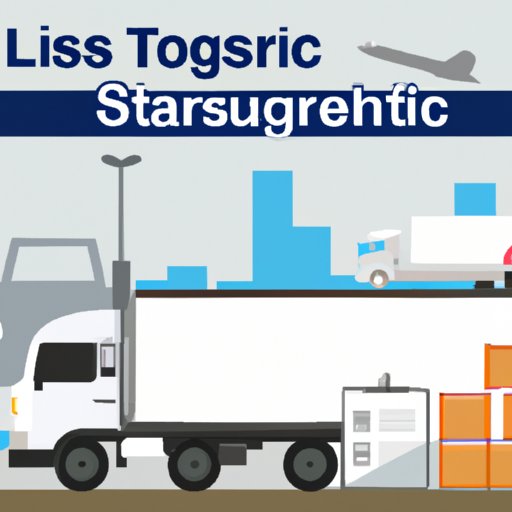Introduction
Logistics is an important part of many businesses. It involves managing the flow of goods from the manufacturer or supplier to the customer. A logistics business provides services such as transportation, warehousing and inventory management. Starting a logistics business can be a lucrative venture but it also requires a lot of hard work and preparation.
This article will provide a step-by-step guide on how to start a logistics business. We’ll cover topics such as understanding the market, developing a business plan, securing financing, hiring employees, obtaining licenses and permits and purchasing equipment and vehicles.
Research the Logistics Industry
The first step in starting a logistics business is to conduct research. Understanding the industry and the competition is essential for success. Researching customers and their needs is also important. Knowing who your target customers are and what services they need will help you develop a successful business plan.
You should also research potential suppliers and partners. Having reliable suppliers and partners is key to providing quality service to customers.
Develop a Business Plan
Once you have done your research, it’s time to develop a business plan. Your business plan should include an executive summary, a description of your business, a marketing strategy, an operations plan, a financial plan and a risk management plan.
Your business plan should also include information about your target customers, your competitive advantage, your growth plans and how you plan to manage your finances. Having a well-thought-out business plan is essential for the success of your logistics business.
Secure Financing
Before you can start your logistics business, you need to secure financing. You should create a financial plan that includes information about your start-up costs, operating expenses and revenue projections. Once you have a financial plan, you can begin looking for funding.
There are several options for financing a logistics business. You can apply for loans or grants from banks, government programs or private investors. You can also use personal savings or investments.
Hire Employees
Once you have secured financing, it’s time to start hiring employees. You will need to find qualified personnel to run your logistics business. Drivers, dispatchers, warehouse workers and customer service representatives are all essential to running a successful business.
You should also consider hiring contractors or freelancers to help with certain tasks. This can be a cost-effective way to manage your labor costs while still providing quality service.
Obtain Licenses and Permits
Before you can start operating your logistics business, you need to obtain the necessary licenses and permits. Depending on the type of business you are running, you may need to obtain a federal, state or local license or permit. Make sure you understand the laws and regulations in your area so you can comply with them.
Purchase Equipment and Vehicles
You will also need to purchase equipment and vehicles for your logistics business. Investing in trucks and trailers is essential for transporting goods. You will also need other equipment such as computers, radios and scanners.
You may also want to invest in software to help manage your business. There are many software programs available that can help you manage your inventory, track shipments, and manage customer orders.
Conclusion
Starting a logistics business requires extensive research, financial planning and preparation. This article has outlined the steps necessary to get started, from researching the industry to investing in trucks and trailers. With the right planning and preparation, you can be well on your way to starting a successful logistics business.
(Note: Is this article not meeting your expectations? Do you have knowledge or insights to share? Unlock new opportunities and expand your reach by joining our authors team. Click Registration to join us and share your expertise with our readers.)
